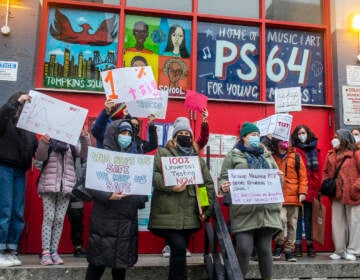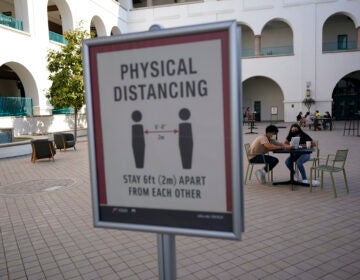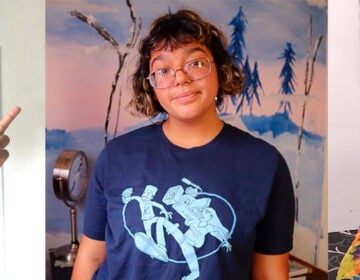Kids are catching ‘Ivy League Fever’ and the pressure to succeed is leaving many overwhelmed and burned out
Kids, often barely out of elementary school, are internalizing the idea that their futures depend on getting into an Ivy League school.
Listen 8:07
Before becoming a student at The University of Pennsylvania, Najay Greenidge experienced ‘Ivy League Fever’ in grade school. (Courtesy of Najay Greenidge)
This story is from The Pulse, a weekly health and science podcast. Subscribe on Apple Podcasts, Spotify, or wherever you get your podcasts.
Find our full episode on education here.
For generations, the Ivy League has been seen as the pinnacle of academic success. Harvard, Yale, Princeton, Penn — are institutions that conjure images of Nobel laureates, corner offices and cabinet positions. A degree from one of these elite institutions carries the promise — or at least the perception — of a secure future.
Students are finding the race to get there starts earlier and runs hotter than ever before. Getting into one of these schools is increasingly requiring perfection in every measure: grades, test scores, extracurriculars, community service and more. It’s an arms race that now starts long before a child truly understands what the “Ivy League” means.
For Selah Derby, a 17-year-old rising high school senior, it started in the 3rd grade.
“I was like, ‘I’m going to Harvard because I want to be president of the United States.’”
That decision, made before she had even mastered multiplication tables, came with a relentless set of self-imposed expectations: perfect grades, perfect SAT scores and a perfect resume. “I can’t make mistakes.”
Selah’s story is hardly unique. Across the country, students describe the same phenomenon: children, often barely out of elementary school, internalizing the idea that their futures depend on getting into one of eight prestigious schools. That pressure fuels anxiety and a cycle of overwork and self-doubt that doesn’t let up, even when — and especially when — they succeed.
Emmy McGill, 17, describes her own experience navigating this culture of overachievement.
“I was looking online at these videos where people were talking about their extracurriculars — insane things like internships with U.S. senators, which I still don’t even know if [they] were real,” she said. “And I was like, oh, getting A’s isn’t enough for this. Doing my best isn’t enough for this. I felt like it became this race to always do more and to always be competing.”
The culture of comparison
Pawan Dhingra, author of “Hyper Education: Why Good Schools, Good Grades, and Good Behavior Are Not Enough,” says this escalation reflects a cultural shift in what we consider “academic success.” The constant push to outdo peers with more APs, more extracurriculars and more accolades creates its own momentum. “It starts to create a new normal,” says the sociologist and Amherst College professor. “Now being at grade level starts to feel like you’re behind.”
The sense of competition isn’t just coming from classmates. Social media has turned college admissions into another performance students put on for their followers.
“There’s such a culture of comparison especially with the internet now,” Emmy said, “[On] Reddit and TikTok and Instagram Reels especially, everyone’s posting what could be real or fake college admissions results every year and people are comparing themselves to these profiles that don’t even have a face to put to them.”
Subscribe to The Pulse
Every spring, thousands of teenagers post “decision reaction videos,” where they film themselves opening Ivy League acceptance or rejection letters in real time. The most dramatic ones go viral, turning a personal moment of achievement into another piece of content on the timeline. Students, meanwhile, learn to measure themselves against strangers they’ll never meet; anonymous usernames who claim five internships, three nonprofits they’ve built from the ground up, and a 1600 on their SATs.
That constant competition — both online and in school hallways — fuels what psychologists call “achievement inflation.” It’s the sense that no matter what you’ve done, your competition has done better; therefore, now so must you. In the Ivy League context, this inflation can raise the bar to seemingly impossible standards.
“It’s this huge idea that you have to be better and stronger and cure cancer to get into an Ivy League but you have to get into an Ivy League,” Emmy said, “So now you’re fighting and clawing your way to try and do that.”
In this environment, an impressive resume no longer guarantees success, but resets the standard; leaving kids scrambling to outdo themselves and each other every year.
The price of academic success
The consequences aren’t just academic. Students describe guilt, exhaustion, and even isolation in the midst of their achievements. Emmy admits she sometimes feels conflicted about sharing her successes with peers.
“I’ve almost felt guilty sometimes for doing all the things that I do and being excited about it.”
Selah, too, finds herself in a constant loop of second-guessing.
“If I fail to succeed at what I’ve placed myself to do, then I really like it scares me that I’ll never truly be happy, because I’ll just constantly go back to how I didn’t get in or how I failed at this thing. And I feel like it’s just really a never ending cycle.”
She can ace a test or win an award, but instead of feeling satisfaction, her first thought is what comes next — and whether it will be enough. The pursuit of perfection leaves little room for joy, turning important milestones into just another step in an endless climb.
Dhingra warns that burnout, anxiety and depression are common outcomes in these environments.
“Parents lose sight of what they’re hoping to get out of this.” The pressure becomes harmful, he explains, when it is externally imposed instead of being rooted in a kid’s genuine interest.
Breaking this cycle, Dhingra argues, requires a fundamental reframing of success — away from a finish line defined by brand name prestige and toward something more personal and sustainable.
“There’s nothing inherently wrong with having high expectations, obviously, or putting an emphasis on academics or enrolling your kid in these extra spaces.,” Dhingra said. “The problem happens when parents and kids themselves lose sight of what they’re hoping to get out of this. If what you’re hoping to get out of it is academic growth along with nurturing an interest, then that’s great. But if what you’re trying to get out of this is reaching this level of excellence that’s a year, two years, three years beyond grade level, then you’re going to end up burning your child out.”
The realities of rejection
Even the so-called “perfect” student doesn’t always make it in. Acceptance rates at Ivy League schools hover around the single digits. For the class of 2028, Harvard admitted just 3.6 percent of applicants. Yale admitted 3.9 percent. Penn admitted 5.5 percent. So, rejection is not just possible, but it’s inevitable.
For Selah, that uncertainty is a dark shadow over her senior year.
“Other people get to just enjoy school. For me, it’s [about] one thing.” The pressure to actually perform, especially when college is so close, can feel suffocating. “And if I don’t get it — and there’s a very slim chance that I do — then I don’t know what happens next. I don’t know how I get back up from failing to do something I’ve tried my whole life to do.”
Ohm Desai, a recent graduate of the University of Pennsylvania’s Wharton school of business, knows this feeling well.
“I think it’s worth it because I achieved it — not because of the intrinsic value that Wharton in itself provides.”
That mindset, valuing the achievement of getting in over the education itself, reveals the paradox of prestige
For him, the payoff was less about the coveted Ivy League degree, and more about proving to himself that he could make it. “If I didn’t go, I would have been affected by it — I would’ve been affected by it quite a bit.”
But for every student like Ohm, there are hundreds who sacrifice years of their life to chase Ivy dreams, only to find themselves shut out, and struggling to define their worth. What happens when you’ve spent half a decade believing that Harvard or Yale is the only acceptable outcome, only to have that letter say no?
In the end, while the Ivy League may promise prestige, but as Ohm puts it, it doesn’t “really make much of a difference where you would go.” Years of stress, anxiety and non-stop work can make one forget the very purpose of learning.
For students like Selah and Emmy, the challenge isn’t just getting in — it’s remembering that their worth, potential and happiness shouldn’t be defined by a letter in an envelope. True success may be less about the institutions and more about the person who shows up every day; navigating the pressures, setbacks and small victories along the way.
WHYY is your source for fact-based, in-depth journalism and information. As a nonprofit organization, we rely on financial support from readers like you. Please give today.



